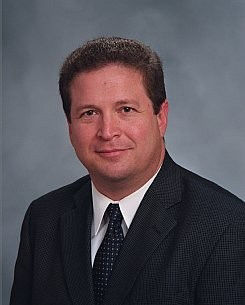Penn State Brandywine's reach in the global community has become even stronger with a new appointment for one of the campus' engineering faculty.
Ivan Esparragoza, associate professor of engineering and associate executive director and vice president of meetings of the Latin American and Caribbean Consortium of Engineering Institutions (LACCEI), was elected vice president for the Americas and first vice president of the International Federation of Engineering Education Societies (IFEES) at the executive committee meeting of the World Engineering Education Forum 2012 in Buenos Aires, Argentina.
IFEES is a professional organization committed to positively impacting global development and socio-economic growth through promoting excellence in engineering education around the world for the formation of a well-educated workforce of global engineers. IFEES brings together different stakeholders in engineering education, including worldwide engineering education associations, student associations, private and governmental agencies and private corporations to create synergy among the members to enhance engineering education.
"This is a great professional achievement and allows me to interact with important leaders in engineering education around the world," Esparragoza said. While attending the conference, he also presented a paper titled, "A LACCEI-IGIP Partnership: Developing Internationally Recognized Engineering Faculty Excellence for the Americas."
In his role as vice president of IFESS, he said that he will work closely with the president to advance his goal of strengthening collaboration among members of this organization. "Through these collaborations, common interests and opportunities will be shared and built on," Esparragoza said. "I also hope to see curriculum development for instructors, particularly in Latin America and the Caribbean, and workshops for academic administrators in that area."
Esparragoza shares his experiences from IFEES meetings and conferences with his students. "I learn new approaches and tools to be used in the classroom, but also a broader view of engineering education," he said. "I bring examples and personal experiences back with me so my students can understand the challenges and great opportunities in engineering."
During his one-year term as vice president, he said he will take full advantage of this opportunity to contribute to engineering education in this hemisphere and around the world.
"Developing internationally recognized engineering faculty requires preparing engineering instructors with the knowledge of content and skills in pedagogy and technology so they can bring together those elements into the classroom in an effective form," he said. "Engineering instructors require more than technical knowledge of the discipline; they should have the skills to convey that knowledge in an effective way in the classroom and they should know also how to use technology available to explain technical content, make challenging concepts easy to understand and as a pedagogical tool to deliver material and assess knowledge."
Esparragoza is very excited about Penn State Brandywine's new four-year general engineering program with a multidisciplinary design option. "It is well aligned with the needs of many industries that require engineers with a clear understanding of how systems work and the interaction between mechanical and electrical components controlled by computerized devices," he said. "Engineers graduating in this discipline will have ample knowledge in mechanical, electrical and control systems and will be ready to work in multidisciplinary teams in many industries."
To learn more about this degree, visit http://www.bw.psu.edu/Academics/Degrees/bs_engineering.htm online.
